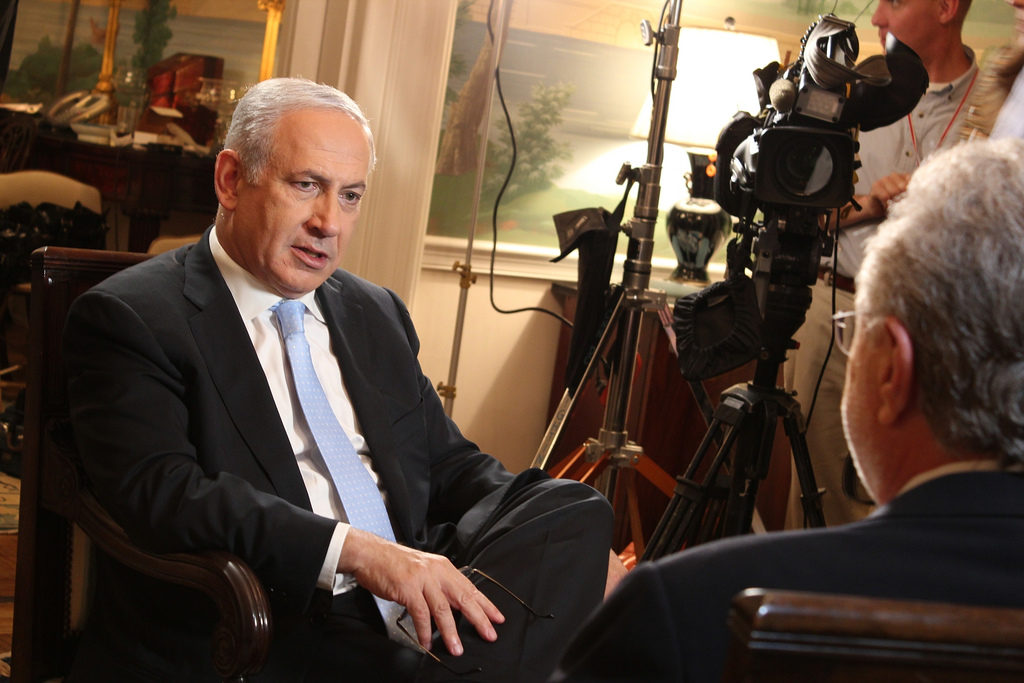UPDATES
In first interview Netanyahu explains to CNN’s Wolf Blitzer Israel’s war aims
July 22, 2014 | Gabrielle Debinski

On July 20, Israel’s Prime Minister, Benjamin Netanyahu, gave his first formal media interview since Israel launched ‘Operation Protective Edge’ in response to incessant Hamas rocket fire just over two weeks ago.
The full interview can be viewed here.
Speaking to CNN reporter, Wolf Blitzer, Netanyahu talked extensively for almost fifteen minutes about the objectives of Israel’s operation, which has seen over 40,000 Israeli soldiers and reservists called up to deter Hamas from continuously firing rockets at Israeli cities from what has become a terrorist enclave in the Gaza Strip.
Critics and supporters of the Israeli PM alike have praised Netanyahu for his clarity of expression and strong delivery in his first formal interview since the new round of violence broke out.
Much of Blitzer’s interview focused on Israel’s ‘exit strategy’ and what in fact the Israeli government hoped to achieve through its operation.
“We will stop our operations when we can bring back quiet to our people,” Netanyahu said.
The Israeli PM articulated “sustained quiet and security” as the ultimate objective.
“And we’ll take whatever action is necessary to achieve that.”
But when asked how long this would take, Netanyahu made it clear that Israel can never preempt actions or events, especially when fighting against a “cynical, brutal and heartless enemy” – Hamas.
Despite not wanting to divulge details of Israel’s operation, Netanyahu made it abundantly clear that destroying Hamas’ terror tunnels is a primary focus and Israel will not withdraw until this objective is achieved in its entirety.
“We’re taking action right now to neutralize those tunnels and we’ll continue that action as long as is necessary.”
He also pointed out that those tunnels say something important about Hamas’ intentions – and the purpose of Israel’s blockade of dual-use goods into Gaza – including, most controversially, cement.
“I think many people in Gaza understand that Hamas is destroying Gaza, destroying their lives. They have taken tons – not tons – tens of thousands of tons of concrete that we enable them to bring into Gaza to build skyscrapers, to build schools, to build hospitals.”
“You know what they did with that, Wolf? They put 700 tons of concrete into each one of these terror attack tunnels to penetrate Israel. Now, we have discovered dozens of them. So you’re talking about tens of thousands of tons of concrete, instead of going for the benefit of the school, the population, is going for terrorism against Israel.”
He later stated:
“I think the important thing right now is not to begin to put terms on it [the operation]. I think the important thing is to end hostilities and then get into a situation where we have a sustainable cease-fire. That means beginning to discuss the demilitarisation of Gaza.”
Meanwhile, when faced with questions about the much larger number of Palestinian causalities, compared to the lesser number of Israeli deaths, the Israeli Prime Minister noted that Israel does its utmost to prevent civilian deaths.
“We’re sad for every civilian casualty. They’re not intended. This is the difference between us…”
“We use anti-missile systems to protect our civilians, they use their civilians to protect their missiles, that’s the difference.”
“If you look at our response it’s actually been very measured and we’re trying to be as pinpointed as we can,” he said.
Netanyahu went on to acknowledge the support from US President Obama and other world leaders who have publically noted Israel’s right to defend itself against Hamas rocket fire, but he took aim at those (without using names) who say, “You have the right to self-defence, as long as you don’t exercise it.”
“What would the United States do if rockets were falling?” he asked. He also noted for American audiences,
“Just imagine – I mean, imagine what Israel is going through. Imagine that 75 percent of the U.S. population is under rocket fire and they have to be in bomb shelters within 60 to 90 seconds. So, I’m not just talking about New York – New York, Washington, Chicago, Detroit, San Francisco, Miami, you name it.”
US Secretary of State John Kerry, and UN Secretary-General Ban Ki-Moon, have just touched down in the region aiming to negotiate a ceasefire between Israel and Hamas. Israel has repeatedly claimed that as soon as Hamas stops launching rockets it will cease its retaliatory fire. The catchphrase “quiet will be met with quiet” has defined the outlook of the Israeli PM over the last fortnight.
However, the constant discovery of new terror tunnels in southern Israel, used to transport weapons and terrorists planning deadly attacks on Israeli citizens, brings a new dimension to Operation Protective Edge and the conflict’s ‘endgame.’
On this, the Israeli Prime Minister made his intentions abundantly clear – a ceasefire should not be a simple return to the dangerous and unstable status quo ante:
“Once this is put in place…we really have to undertake a program to demilitarise Gaza and to change the situation because it is unacceptable.”
Gabrielle Debinski
Tags: Israel





